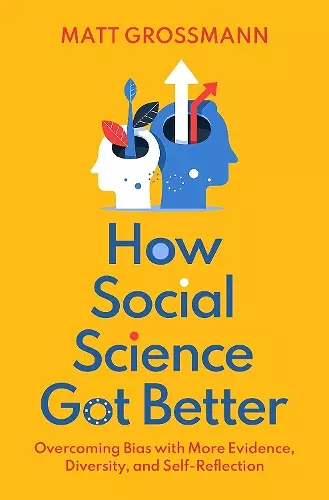How Social Science Got Better
Overcoming Bias with More Evidence, Diversity, and Self-Reflection
Format:Hardback
Publisher:Oxford University Press Inc
Published:11th Nov '21
Currently unavailable, and unfortunately no date known when it will be back

It seems like most of what we read about the academic social sciences in the mainstream media is negative. The field is facing mounting criticism, as canonical studies fail to replicate, questionable research practices abound, and researcher social and political biases come under fire. In response to these criticisms, Matt Grossmann, in How Social Science Got Better, provides a robust defense of the current state of the social sciences. Applying insights from the philosophy, history, and sociology of science and providing new data on research trends and scholarly views, he argues that, far from crisis, social science is undergoing an unparalleled renaissance of ever-broader understanding and application. According to Grossmann, social science research today has never been more relevant, rigorous, or self-reflective because scholars have a much better idea of their blind spots and biases. He highlights how scholars now closely analyze the impact of racial, gender, geographic, methodological, political, and ideological differences on research questions; how the incentives of academia influence our research practices; and how universal human desires to avoid uncomfortable truths and easily solve problems affect our conclusions. Though misaligned incentive structures of course remain, a messy, collective deliberation across the research community has shifted us into an unprecedented age of theoretical diversity, open and connected data, and public scholarship. Grossmann's wide-ranging account of current trends will necessarily force the academy's many critics to rethink their lazy critiques and instead acknowledge the path-breaking advances occurring in the social sciences today.
Only a few decades ago, social scientists merely studied the problems of human society. Today we contribute to their solution—finding their causes; developing new methods, theories, and datasets; proposing and evaluating public policies; and building a science of human behavior. A change this monumental deserves this important book with Matt Grossmann as our expert tour director. Don't miss it. * Gary King, Harvard University *
Grossmann's brilliant book provides a nuanced, thoughtful analysis of the improving trajectory of social science resulting from bigger better data, a more diverse and interdisciplinary academy, methodological advances, and greater engagement with the real world. A book of major importance for practicing social scientists, as well as for the rest of the world who try to understand what social scientists do. * Scott Page, University of Michigan *
As social science has become more popular and public, it has also come under assault on many fronts. Yet in this compelling and provocative book, Matt Grossmann offers an important counter, arguing that the social sciences are stronger and more vibrant than they have ever been due to the increasing diversity of practitioners, growing humility and caution in offering grand claims, and vast expansions of available data and evidence. Most importantly, Grossmann argues that social science has both the incentive for, and multiple means of, correction and regulation that persistently push scholars in the direction of the truth. The book is sure to generate considerable debate and discussion, but its primary thesis is unquestionably hopeful: The social scientists are alright. * Christina Wolbrecht, University of Notre Dame *
In this optimistic and self-reflective book, Grossmann reminds us that the social sciences are absolutely fundamental to understanding ourselves, our societies, our politics. He shows how the social sciences have turned their ample analytical powers to improving our techniques, data, and capabilities to improving our understandings. The book makes a strong case that social science has improved and that improvement can continue. * Roger Pielke Jr., University of Colorado Boulder *
How Social Science Got Better is wide-ranging, accessible, fair-minded, and deeply informed—an indispensable guide to trends in the social sciences and how they make the claims they do. Covering topics from the reproducibility crisis to political polarization, it will be invaluable to a wide swath of social scientists who care about making their fields better—and to a broader public asking hard questions about the value of social science today. * Elizabeth Popp Berman, University of Michigan *
ISBN: 9780197518977
Dimensions: 236mm x 160mm x 33mm
Weight: 658g
352 pages